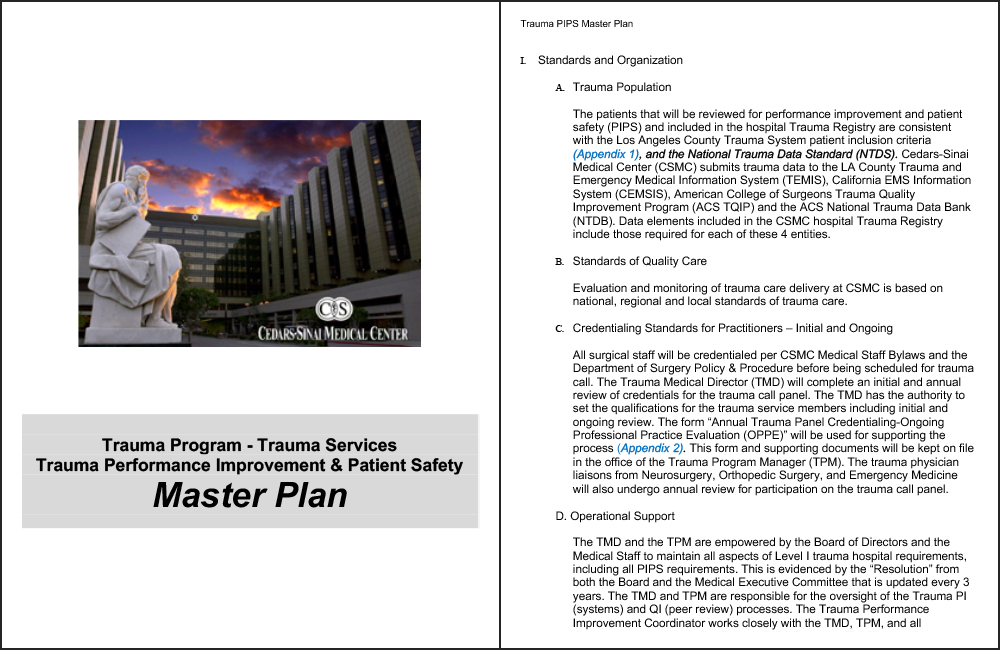
Cedars-Sinai; Trauma PIPS Master Plan
A. Trauma Population
The patients that will be reviewed for performance improvement and patient safety (PIPS) and included in the hospital Trauma Registry are consistent with the Los Angeles County Trauma System patient inclusion criteria (Appendix 1), and the National Trauma Data Standard (NTDS). Cedars-Sinai Medical Center (CSMC) submits trauma data to the LA County Trauma and Emergency Medical Information System (TEMIS), California EMS Information System (CEMSIS), American College of Surgeons Trauma Quality Improvement Program (ACS TQIP) and the ACS National Trauma Data Bank (NTDB). Data elements included in the CSMC hospital Trauma Registry include those required for each of these 4 entities.B. Standards of Quality Care
Evaluation and monitoring of trauma care delivery at CSMC is based on national, regional and local standards of trauma care.
C. Credentialing Standards for Practitioners – Initial and Ongoing
All surgical staff will be credentialed per CSMC Medical Staff Bylaws and the Department of Surgery Policy & Procedure before being scheduled for trauma call. The Trauma Medical Director (TMD) will complete an initial and annual review of credentials for the trauma call panel. The TMD has the authority to set the qualifications for the trauma service members including initial and ongoing review. The form “Annual Trauma Panel Credentialing-Ongoing Professional Practice Evaluation (OPPE)” will be used for supporting the process (Appendix 2). This form and supporting documents will be kept on file in the office of the Trauma Program Manager (TPM). The trauma physician liaisons from Neurosurgery, Orthopedic Surgery, and Emergency Medicine will also undergo annual review for participation on the trauma call panel.
D. Operational Support
The TMD and the TPM are empowered by the Board of Directors and the Medical Staff to maintain all aspects of Level I trauma hospital requirements, including all PIPS requirements. This is evidenced by the “Resolution” from both the Board and the Medical Executive Committee that is updated every 3 years. The TMD and TPM are responsible for the oversight of the Trauma PI (systems) and QI (peer review) processes. The Trauma Performance Improvement Coordinator works closely with the TMD, TPM, and all departments to maintain the Trauma PIPS Program. The Trauma Registrars support the PIPS process with a concurrent data process. The concurrent data process is dependent on adequate staffing. In the event of an inability to maintain par trauma registry staffing levels, data backlog will occur. All efforts, (administratively), will be implemented to sustain a concurrent data process to meet all Level I trauma hospital data and PIPS requirements.
Specifications
- Last Updated: 2018
- Author(s): Cedars-Sinai Medical Center
- Category: Performance Improvement
- Tags: 2018, Cedars-Sinai Medical Center, English
Word Documents
Please login to access file downloads.
PDF Documents
Please login to access file downloads.
